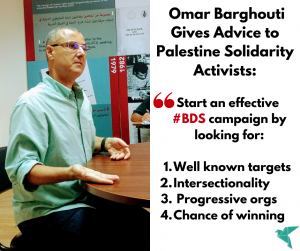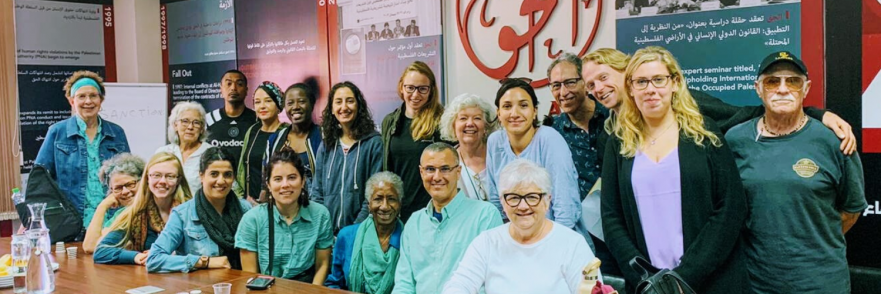By Eli Gerzon
For about twenty years Eyewitness Palestine has organized travel tours for people to see first-hand what is happening in Israel/Palestine. I attended the Climate Change and Olive Harvest themed tour this October-November 2019. For 11 days our group of 22 people met with organizers, farmers, lawyers, and elected officials. One highlight of the tour was a talk by Omar Barghouti about the movement known as BDS: Boycott, Divestment, and Sanctions. BDS is a global movement initiated by Palestinian civil society calling on people and organizations around the world to put pressure on Israel until it complies with international law.
I’ve been active in Palestine solidarity work, including BDS, for several years. I’m from Boston and I’m a member of Jewish Voice for Peace (JVP). The Boston chapter of JVP is one of the most active in the country. I volunteer as the person in charge of social media, which I also do for a living: social media consulting for organizations and individuals focused on social justice. Most of my fellow travelers on the delegation are activists and organizers from the USA who also already knew a lot about Palestine. But we all learned a huge amount of new information every single day on the trip.

This was particularly evident during a talk by Omar Barghouti at the Al Haq office in Ramallah, West Bank on November 4th. Barghouti addressed misconceptions about BDS and quickly cut through seemingly difficult questions with a direct and ethical approach based in history. He also talked about the impressive successes of the BDS movement, while acknowledging the challenges ahead.
History of BDS
The BDS movement started in 2005 when 170 Palestinian non-governmental organizations initiated a campaign calling for a boycott, divestment and international sanctions against Israel until it complied with three basic demands:
1. Ending Israel’s occupation and colonization of all Arab lands and dismantling the Wall
2. Ending racial segregation: recognizing the fundamental rights of the Arab-Palestinian citizens of Israel to full equality
3. Granting the right of return for Palestinian refugees: respecting, protecting and promoting the rights of Palestinian refugees to return to their homes and properties as stipulated in UN Resolution 194
Barghouti emphasized that the BDS movement is modeled on the divestment against apartheid in South Africa, but, he said, “It’s important for local BDS campaigners to adapt their tactics to their local context.” Many people, including Nelson Mandela and Archbishop Desmund Tutu, have credited the international divestment movement for playing a vital role in ending apartheid in South Africa.
“We let people run their campaigns around the world as works for their context. We only intervene if they violate our principles including racism in any form. That includes anti-Semitism, anti-LGBT, anti-Latino etc.” Barghouti then cited one example where a BDS group shared anti-Semitic posts on Facebook. The BDS Movement asked them to remove that content. When the group didn’t reply within a week the BDS Movement released a statement disowning the group and denouncing their anti-Semitism.
Clarity on Tactics and Strategy
Barghouti insisted that BDS targets complicity, not identity: “If they have a boot on our neck, we target them.”
He explained if an Israeli artist is planning to perform somewhere in the US as an individual, that would not warrant being targeted by BDS. If the Israeli artist is racist, “and most of them are, it’s just a fact” according to Barghouti, that still wouldn’t warrant BDS. “If local organizers want to target the artist for their racism, that’s fine and good. We’d hope people would do that sort of thing anyway. But it’s not part of BDS.”
“Now if that same artist is performing in the same place but the event is sponsored by the Israeli government – then that warrants BDS.”
I found those distinctions helpful, even as someone who has worked on BDS for years. I also learned from what he said about the academic boycotts and what’s happening on college campuses.
“Many academics have boycotted Israel academic institutions that are complicit in Israel apartheid. According to BDS principles you don’t reject articles by Israeli academics simply because they are Israeli. You would only do that if they are in the senior administration.” Again, he reinforced that BDS is not about going after individuals, it’s about the complicity of the institutions. And later on, Barghouti said, “Research is coming out soon showing every single Israeli university is complicit in the apartheid.”
Barghouti also said, “Nowadays many campuses have dozens of organizations supporting BDS. And only far-right groups are anti-Palestinian.”
Barghouti also emphasized the need to be strategic. “We prioritize certain companies as targets in the movement.” He shared these four criteria which people who want to organize BDS campaigns should consider:
1. Intersectionality – It’s more effective and powerful when we can work with other groups.
2. Well known target– It’s easier more significant wins and to get media attention when you pick a target that has a high profile, as opposed to something obscure.
3. Chance of winning – For example, Intel and Amazon are very guilty for their complicity in Israel’s colonization of Palestine, but they are are too big to boycott, and therefore not a strategic target.
4. Progressive organizations – It’s important to to go after organizations that claim to be progressive but actually contribute to the harm done to Palestinians.
These criteria help address the argument, usually made in bad faith, that if you really support BDS you shouldn’t use iPhones because they have components invented in Israel. The BDS movement isn’t required to boycott everything associated with Israel in order to be legitimate or successful.
In part two, I’ll share the successes of BDS that Barghouti highlighted and his recommendations on how to respond to common criticisms of BDS.
Eli Gerzon is a freelance writer and social media consultant born and based in Boston, MA, USA. They use they/them pronouns. You can find them on Twitter, Facebook, and Instagram at @eligerzon.

